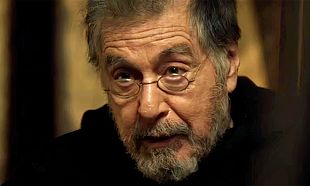Todd Solondz has directed two films since his controversial Happiness but it's still that 1998 opus that remains the film in his canon to see. In Life During Wartime the writer-director attempts a sequel of sorts - same characters, different actors - with mixed results.
Life During Wartime opens with a replica of Happiness' curtain raiser: Allen (The Wire's Michael K Williams, replacing Phillip Seymour Hoffman) and Joy (Henderson, replacing Jane Adams) sit quietly in a restaurant waiting to order. Joy has stuck with Allen through his perversion (he makes seedy phone calls) and is willing to make a go of things until a waitress who recognises his voice won't let him forget. Joy moves to Florida for a break and meets up with sister Trish (Janney, formerly Cynthia Stevenson), who is embarking on a relationship (with Michael Lerner), Meanwhile, Trish's paedophile husband Bill (Hinds, taking over the reigns from Dylan Baker) is out of jail and attempts to track down their son, now at college.
Never one to shy away from tough questions, Solondz here explores forgiveness - what it means to give it and accept it - and asks 'Is a paedophile deserving of forgiveness? And if you forgive but don't forget, is that really forgiveness?' Even though he doesn't have an answer himself, Solondz throws it out there for debate. This is Life During Wartime's inescapable theme - inescapable because Solondz really rams it home: 'forgiving and forgetting' is uttered by most characters throughout the running time. The film seems to exist solely for this purpose.
But it isn't Life During Wartime's controversial message that could keep the viewer at arm's length, it's everything else. Everything is played in the distance, something to be observed rather than immersed in. The director's typical black humour, although interesting to find in such a film, has the danger of enhancing alienation even further. The re-casting is distracting and it takes a moment to nail down who is who. The characters never feel like people and Solondz's inclusion of Andy's ghost (Andy having killed himself when Joy rejected him in Happiness) is doubly jarring. Played by Jon Lovitz in the original, the re-casting of Paul Reubens (in a comeback after another situation in his private life) reinforces Life During Wartime's message; but did Solondz cast Ruebens for his ability to play the role (he's decent by the way) or because he believes Ruebens is deserving of forgiveness too? Either way the question niggles away at the viewer when they should be immersed in the story.
Ruebens' small role is backed up by a quiet but powerful turn from the vastly underrated Hinds. His scene with Charlotte Rampling sees two masters sparring with each other through harsh, bitter dialogue that they spit rather than speak – their scenes will stick in the memory long after the credits roll. Life During Wartime lacks Happiness' rawness but Solondz, as usual, gives the moviegoer a lot to mull over and very few filmmakers are prepared to do that today.







































































